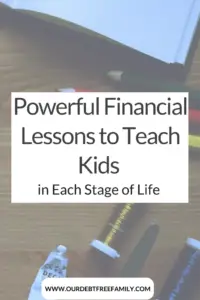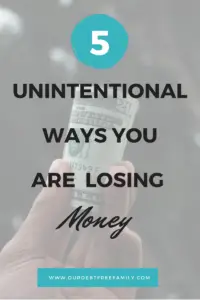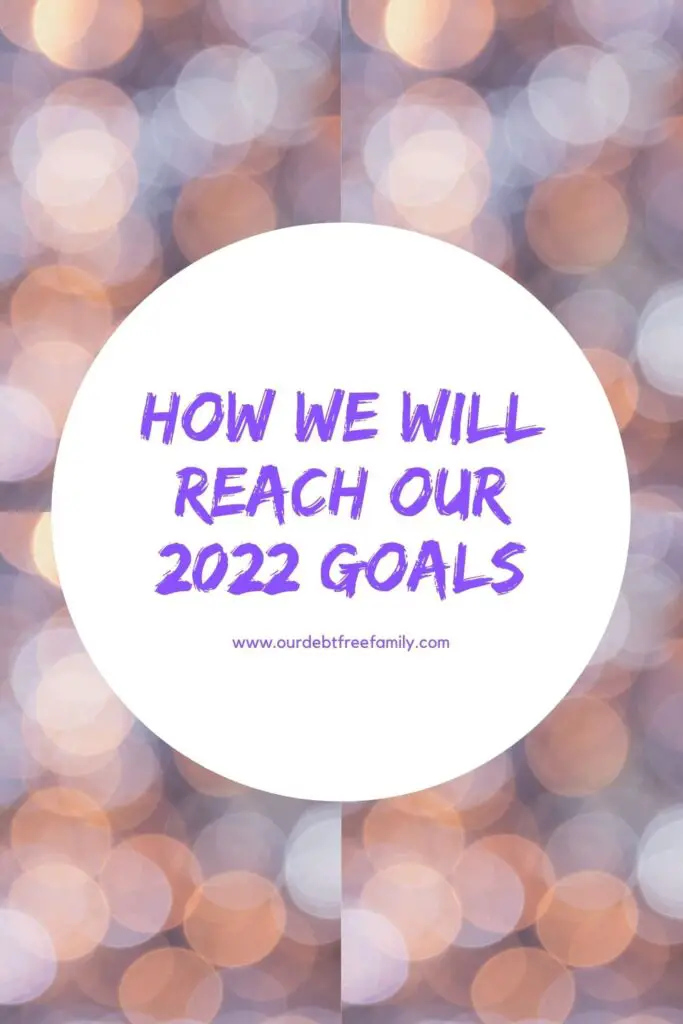
As parents, it’s so important to teach our kids about money, so when they leave the nest we can feel confident that they won’t learn many money mistakes the hard way like [Read more…]
Commit. Plan. Take action.

As parents, it’s so important to teach our kids about money, so when they leave the nest we can feel confident that they won’t learn many money mistakes the hard way like [Read more…]
When I introduced myself on Our Debt Free Family blog I wrote that my husband and I paid for our wedding on our own. With our 6 year anniversary coming up I wanted to share a bit more about how we did that.
Why did we pay for our wedding? [Read more…]
 Contact lenses are those items that you need but hate to buy because of the price. Every time I buy them it hurts, especially if I can get them cheaper elsewhere! My husband and I both wear contacts and our vision insurance covers our yearly eye appointment and one of the following: up to $300 for glasses or up to $130 for contacts. Because of the better deal, we always opt in for using the insurance for glasses when our vision changes. So, that means we are paying out of pocket for contacts for the entire year.
Contact lenses are those items that you need but hate to buy because of the price. Every time I buy them it hurts, especially if I can get them cheaper elsewhere! My husband and I both wear contacts and our vision insurance covers our yearly eye appointment and one of the following: up to $300 for glasses or up to $130 for contacts. Because of the better deal, we always opt in for using the insurance for glasses when our vision changes. So, that means we are paying out of pocket for contacts for the entire year.
My husband wears the 1-Day Acuvue contacts because he has a lot of allergies year around and his eyes are really sensitive. Before switching to the 1-Day Contacts from the 30-Day he would have to get prescription eye drops as well.
We normally order his contact lenses from the eye doctor and they were costing around $170 for a 3-month supply. Ouch! About 2 years ago we began ordering them through 1-800 Contacts and they normally run around $145.00 ($72.25 per eye) with free shipping.
Contacts Comparison |
||||
Store |
$ Per Eye |
Shipping |
Additional Steps |
Misc. Information |
Local Eye Doctor |
$90 | Pick Up | Order on-site | N/A |
1-800 Contacts |
$72.25 | Free Shipping | Submit Prescription | Price match guarantee and you can also get a discount when you buy larger quantities. ($61 for 4+ boxes) |
Walmart.com |
$66.00 | Free Shipping | Submit Prescription | Can get a discount if you buy larger quantities. ($56 per box for 4+ boxes) |
Walgreens.com |
$49.50 | Free Shipping | Submit Prescription | Currently offering 25% discount on any contact order. |
Walmart.com always has very competitive prices on almost any item they carry. I also found that Walgreens.com in now selling contacts as well. Walgreens always has promo codes to add to online orders and they have been having a 25% promo code for the last 2 months on contact lenses. Their contacts were originally $66 per eye, but after 25% off it came down to $49.50 per eye!
After much research, I ordered my husband’s contacts through Walgreens. I submitted his doctor’s name and fax number. Walgreens was able to verify the prescription that same day! I ordered his contacts on Monday afternoon and we got his contact in the mail that Friday and saved about $45 compared to our last contact purchase from 1-800 Contacts! That means we will be saving $180 a year on my husband’s contacts alone!
1-800 Contacts has a price match guarantee and you can also get your contact lenses cheaper via rebate if you buy 4 or more boxes. I normally don’t purchase more than a 3 month supply for my husband’s contacts because they are so pricey to begin with. Also, if I don’t have to deal with rebates to get the best deal I gladly decline. The price match guarantee also seems like a lot of trouble. Especially if you are in a hurry to order more. It’s always important to read the fine print with these.
When it comes to saving money I don’t mind going the extra mile in getting the prescription verified as long as I order ahead of time just in case there is any delay. $180 is a lot of money to save in a year on a product you can buy somewhere else and it’s the same brand. Right now ordering our contacts through Walgreens.com is a no brainer!
For more ways to save check out these great articles.
8 Ways to Save Money at Target
Save Money at the Grocery Store with this Quick Tip
52 Week Challenge: Save $1,404 By Saving No More Than $52 a Week!
 When you are trying to pay off debt and save toward financial freedom you can get pretty creative in trying to save money. But sometimes taking [Read more…]
When you are trying to pay off debt and save toward financial freedom you can get pretty creative in trying to save money. But sometimes taking [Read more…]
“What gets measured, gets improved.”
If you haven’t seen my debt freedom progress reports before, each month I bring you a recap of the previous month’s progress on paying off our debt.
This serves two purposes — to keep my husband Mike and me accountable to our financial goals and to give you a look behind the scenes of our strategy for paying off our debt.

If you have been following the news at all recently, you know that the housing market is on fire. Many millennials like us are scared that they won’t ever get to buy a home (if they haven’t already). A few of our friends were lucky enough to buy homes during the height of the pandemic when prices were low. However, since then, the prices have just continued to climb.
There is some good news for people looking to buy a home. The housing market is finally starting to cool off. Yahoo Finance recently reported that if you’re like us and have been priced out of the housing market you may be in luck soon. It may mean relocating for some folks though. Cities that saw big jumps in the price of housing over the last few years will be the ones to decline the most. Here’s a look at the cities where they are expecting the number on the price tag of homes to go down:
That being said, the price drops won’t really start happening until 2023 some time. So, if you were planning to buy a home this year, it may still be too soon.
The good thing about the market being so crazy right now is that it gives you more time to save money for a down payment and work on your credit score. Go through and pay off everything that you can and save as much money as you can with sinking funds for your down payment. With FHA loans, you will only need to put 3.5% down. Where conventional mortgage loans, good rule of thumb is to have 20% to put down so that you don’t have to pay PMI (private mortgage insurance).
Taking a look at the housing market here in N.C., the median listing price is around $254,000. With that in mind, we need to save about $50,000 to have 20% to put down. Honestly, there aren’t many places cheaper than that anywhere else we’d like to live either. So, that is our goal now. By the time we have that saved and a good chunk of our debt paid down, the housing market will likely be cool. If not, we are happy to wait for our turn to buy.
Anyone feeling like we do right now and wondering if they’ll ever be able to buy a home, breathe. The market will eventually calm down. Now is the best time to practice the flexibility that we’ve leaned on so much over the years. Be flexible with your plans and long-term goals. It’s possible that you may have to put off buying a home for another few years. The same goes for any goal that was thrown off by the pandemic or the impending financial collapse. Patience is key. You will reach your goals, but give yourself some grace. Just about everyone is having a tough time right now.
Readers, have you had to delay any of your financial goals due to the housing market and economy?

When it comes to budgeting, there is no “one size fits all” method that works for everyone. However, over the last several years, it seems like budgeting has gotten more and more difficult. Financial influencers seem to make the act of budgeting a 10-step system. While that may work for them, I am someone who needs a simple approach. Here are three straight-forward budgeting methods that have worked for me.
This is the budgeting method we are currently using. It makes you feel a bit like you are living paycheck-to-paycheck because you do bottom out your checking account. The biggest difference is that a portion of that money is put into savings – either a sinking fund, investment account, or emergency savings fund. Our budget also includes money allotted for entertainment and fun so that we don’t feel like we are sacrificing everything sticking to a our budget (something that has hindered us in the past).
To make this work, you need to figure out your take-home income each month. Subtract your necessary expenses like rent/mortgage, utilities, groceries, car, insurance, etc. Take away any debt payments, medical expenses, savings, clothing purchases, and going out money. Determine how much money is leftover after taking those things away. This should go into a savings or investment account. You can also use this cash to pay off debts.
The 50/30/20 method is another popular way to budget. It is straight-forward and requires less work than most budgeting methods. Like zero-based budgeting, you are using your take-home income to determine how much you will spend in different budgeting categories. Fifty percent of your income should go towards necessary purchases as described above. The next 30% are discretionary expenses. This includes things like paying for Netflix, going out, your gym membership, and general life expenses. The final 20% of your take-home should go towards savings and debt.
Rather than creating a budget, consider doing a few things to monitor your finances instead. Honestly, for a long time, I avoided budgeting. It gave me a bit of anxiety to sit down and look at my finances for an entire month (or even week). The “no budget” budget involves tracking your spending, knowing when bills are due (having them on automatic draft, preferably), setting aside money for savings, and whatever is leftover can be spent.
Before you think about adopting this kind of budget, it is easy to go off the rails. You shouldn’t try to go with no budget until you have established good spending habits and know that you are in control of your finances. For me, the “no budget” budget worked to help me start tracking my spending better, but it didn’t help me save or pay off debt faster. I’d say that if you go with this method you should be debt-free (or close to it) and have an established savings.
Readers, do you go by any of the budgeting methods above? If not, how do you budget your money?
P.s. If you’re looking for a bonus way to make money – consider religiously using cash back sites. There are a number of good ones which reliably help you save, Dollar Dig, Rakuten and Swagbucks are some good ones. Cash back sites are under utilized, but nonetheless work well and reliably reduce the cost of buying everyday goods.

If you can avoid it, now is not the time to buy a new car. Hold on to yours, be sure to perform regular maintenance and take care of it. The car market is crazy right now. Here’s what we recently found out.
My husband and I have been discussing getting a new car, especially since the arrival of our little one. Currently, we own a 2015 Volkswagen Golf GTI. It has less than 86,000 miles on it and, though we haven’t been the kindest to it, it runs well. That being said, with the car seat in the back, stroller in the hatch, and us in the front two seats, there is very little room for anything else. Not to mention, we have to bring a diaper bag and anything else the little one may need while we are out. While it may help us save money in some cases, it doesn’t make family trips to the grocery store very easy unless we want to go every two days.
That made us consider looking at a bigger vehicle, either a station wagon or an SUV. One look at the car market made us change our minds though. Most of the vehicles on the market right now are double their regular price, that is if you can find what you are looking for on sale. Cars are hard to find right now, which is why their prices are through the roof. This helps the resale value of our car currently but, because we don’t have a second vehicle, simply selling the car wouldn’t be feasible for us.
We would be trading our car in, receive a higher-than-usual trade-in credit but also be paying higher-than-usual prices for any car we find. As you know, we aren’t trying to add a ton of debt to our family’s tally. In fact, we are trying to do the opposite.
After taking the time to review the market and even chatting with a car salesmen at VW, we decided to keep our cramped car and make it work. We are going to invest some money into getting a few things fixed on the car. Then we are going to get it fitted with a roof rack and pod for the top. This will help us be able to take longer trips and go shopping with the whole family.
On top of that, keeping our car and continuing to work on paying it off will help us reduce our debt. Once we pay it off, we can save and pay cash for the next car. With the car market looking the way it does right now, we are happy to keep our little VW.
Readers, have any of you bought a car recently? What was your experience like in the current market?

Tax season can be a headache, and the thought of owing the government money can put a damper on anyone’s mood. Unfortunately, circumstances can occur that might render it impossible for an individual to pay their taxes. If you find yourself in this situation, it’s important to address it head-on.
Ignoring the issue won’t make it go away. The government takes tax nonpayment seriously and will take action to collect the funds. However, there are alternatives to consider. By being proactive and communicating with the IRS, you may be able to work out a payment plan that fits your budget.
Don’t let tax debt drag you down. Take action and explore your options.
Taxes can be a confusing and overwhelming topic for many people, but understanding your tax liability is crucial to avoiding unpleasant consequences. Your tax liability is simply the total amount of taxes you owe to the government, including various state and federal taxes.
This figure includes not only income tax but also property tax and self-employment tax in some cases. You can use the Taxcaster tool from TurboTax to get a better idea. Knowing your tax liability is essential for staying compliant with tax laws and avoiding penalties. So, take the time to carefully calculate your tax liability and ensure that you are on track with your tax obligations to avoid any unexpected surprises down the road.
When you can’t pay your taxes on time, the IRS (Internal Revenue Service) and state tax agencies will begin to charge interest and penalties on the unpaid balance. These additional charges can quickly escalate your tax debt.
If you continue to ignore your tax debt, the government may place a tax lien on your assets, including your home, car, and bank accounts. A tax lien can make it challenging to sell or refinance your property until the debt is satisfied.
According to Ideal Tax, the IRS has the authority to garnish your wages if you owe back taxes. This means a portion of your paycheck will be automatically deducted to repay your tax debt, making it even harder to meet your living expenses.
In the most extreme cases, the government may seize your assets to cover your tax debt. This means that they could take possession of your property, vehicles, or other valuables as a means of debt recovery.
And if you thought that your bank account was safe, think again. The government has the power to issue a bank levy, which freezes any withdrawals or transactions from your accounts. It’s a harsh measure taken to recover the funds owed, and one that should be avoided at all costs.
One option to consider is setting up an installment agreement with the IRS. This allows you to make monthly payments towards your tax debt, making it more manageable over time.
In some situations, you may be eligible for an Offer in Compromise, which is a settlement that allows you to pay less than the full amount of your tax debt. However, this option is typically only available if you can demonstrate financial hardship.
If you are currently facing significant financial hardship, the IRS may temporarily designate your account as “currently not collectible.” This means they will halt any collection actions until your financial situation improves.
Filing taxes can be an intimidating process, filled with endless forms and complex regulations that seem to be in a constant state of flux. Trying to navigate these waters alone is a daunting task, but thankfully there are professionals who can help. By seeking the advice of a tax attorney or certified public accountant (CPA), you can rest assured that your tax issues will be handled with the expertise they require.
These professionals have spent years studying the intricacies of tax law and staying up-to-date with the latest developments, meaning they know how to guide you through the process while minimizing your stress and maximizing your potential savings. Don’t let tax issues weigh you down: seek out professional help today, and take control of your financial future.
Facing tax debt can be a challenging and stressful experience, but it’s essential to address the issue promptly. Ignoring your tax debt can lead to severe consequences, including accruing interest and penalties, tax liens, wage garnishment, and even the seizure of assets.
However, there are options available to help you manage your tax debt, such as installment agreements, offers in compromise, and Currently not collectible (CNC). It’s crucial to consult with a tax professional to determine the best course of action for your specific situation.

Everyone is talking about what their resolutions for the new year are. I spoke about our financial resolutions in a post on the blog here recently. What most people don’t talk about is the dedication, motivation, and hard work it takes to accomplish each of those goals. It takes a substantial amount of planning and twice as much dedication. So, I’m sharing with you how we plan to reach our 2022 goals.
As I mentioned in a previous post, our financial goals mostly center around getting organized. Our finances really aren’t very organized. We need to open up a tax account, a separate savings account, IRAs, and savings for our daughter’s education. At the beginning of the year, we may also be considering trading in our vehicle after we file taxes. However, we aren’t solely focused on improving our money situation. Everyone has other goals they want to accomplish in life.
Personally, I’d like to continue practicing yoga in the new year. I also want to lose this baby weight and keep up my book-a-week reading habit. I also intend on continuing to learn German and would like to take some sort of class outside my general realm of things. I’m also taking a vow to take one day off from social media entirely every week.
That being said, we’ve got some pretty lofty goals we want to meet in 2022. So, we are going to need a solid plan to reach them. Where our financial resolutions are concerned, we are going to start the year off on the right foot by filing our taxes and getting everything paid off. Admittedly, filing will be a little more expensive this year. We made more and have more write offs. There are some other unexpected expenses coming up as well (emergency dental work for me). Thankfully, we have a plan for all of it. We’re stashing away a percentage of everything we make, even small freelance checks, and putting it towards getting these things taken care of.
Budgeting will play a huge role in reaching our money goals this year too. We will need to budget for our various savings plans, retirement, and taxes. It will be a challenge but sticking to our planned budget will be crucial. On the personal side of things, planning and prepping have always been key to success in my life. When I take the time to plan things out, they typically go well.
This year, that means more meal plans and food prep. It will also mean taking on a better routine all around so that I can maintain motivation and stability. Noting how I’ll spend my day and what I’ll eat helps everything else stay on track in some way. The same can be said of our finances. I keep a calendar budget and stick to it. Finding what works for you in terms of planning and honing in on it will help you reach your 2022 goals.